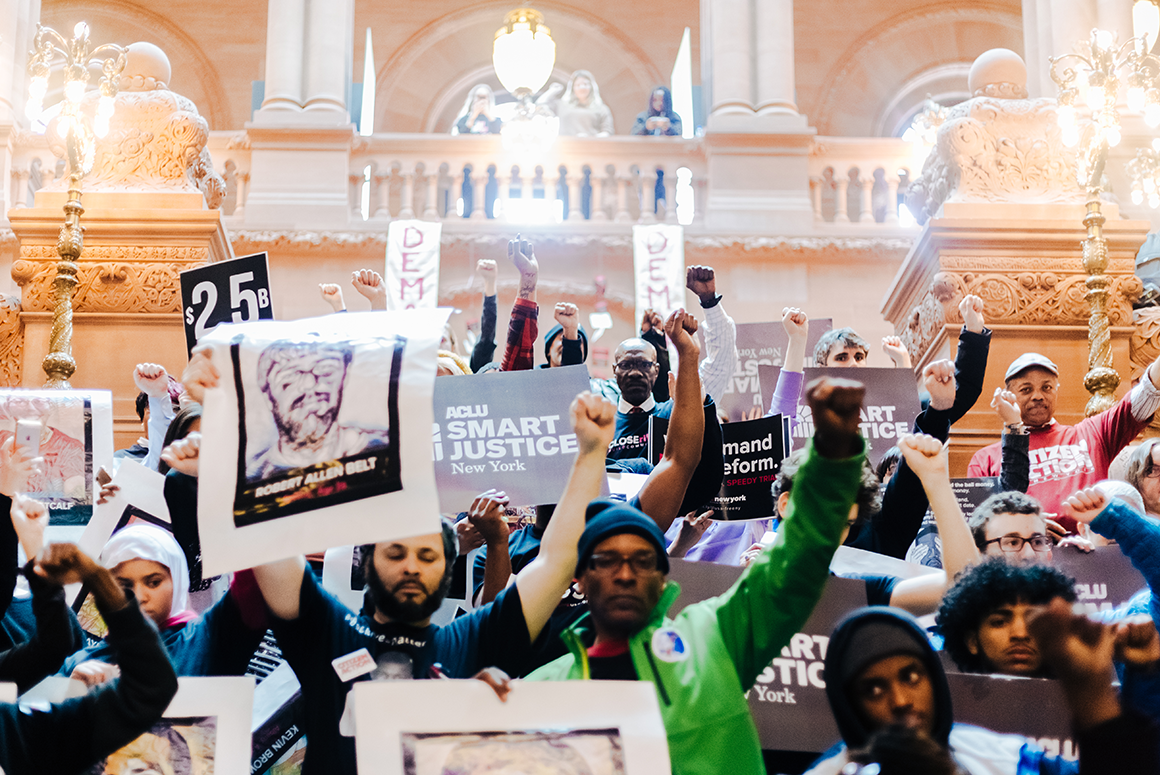A Long Island Legislature is Robbing New Yorkers of Color of their Voting Rights
Civil Liberties Union

Donna Lieberman and Nicole Triplett
For decades, access to justice — including the presumption of innocence — depended on wealth.
Even if you were accused of the most minor of misdemeanors like shoplifting, or jumping the turnstile in the subway, you were allowed to remain free if you could afford the bail. But if a judge set $250 or $500 or $2,000 bail and you couldn’t afford it, you were forced to remain in jail.
As a result, tens of thousands of New Yorkers each year were forced to spend time in jail — a week, months, sometimes well over a year. And, many people have been pressured by virtue of being held in jail away from their children, unable to return to work or school, to plead guilty — to get the case over with, to get time served or simply to end the uncertainty.
Access to justice far too often depended on whether you could afford to buy your freedom while you asserted your innocence. And the people thrust on the wrong side of the bars were overwhelmingly people of color.
To rectify this systemic injustice, the state Legislature last year adopted long-overdue reforms to New York’s pretrial system. And already they are under attack.
These measures will significantly reduce our state’s reliance on cash bail and make it easier for people to get a fair and speedy trial. They should make our state fairer for thousands of New Yorkers.
But people who want to go back to the bad old days are ratcheting up the pressure on elected officials to dismantle these important reforms.
Some are seizing on the string of horrific anti-Semitic attacks that have rocked the state. We stand in solidarity with our sisters and brothers in the Jewish community who are seeing this unthinkable and devastating violence. But we also know that mass incarceration is not going to stop hate crimes, and backtracking on justice is not the answer.
What this fear-mongering narrative about the bail laws fails to include are the hundreds of success stories that have happened in the past weeks because of this new law — low-income, legally innocent New Yorkers being released to their families, jobs, and communities as they answer the charges against them.
The bail law that went into effect this year applies to most misdemeanors and non-violent felony cases. It will mean that thousands of New Yorkers who are presumed innocent of these charges will no longer be forced to sit in jail awaiting trial, pressured with every passing day to plead guilty whether they did it or not. The new laws will make our criminal system more just and bring us closer to realizing the constitutional principle that everyone is innocent until proven guilty.
But some proposals being floated in Albany to change the bail law would punish legally innocent people, increase racial bias, and criminalize poverty without making us any safer.
One of these proposed loopholes would add hate crimes to the list of crimes that are still eligible for cash bail. Money bail doesn’t protect people or prevent them from committing crimes. It only allows wealthier people accused of crimes to walk free while those who are poor stay locked up.
In fact, research shows that detaining people pretrial actually raises the risk to public safety. That’s because pretrial detention increases the chance of someone committing a crime once they are eventually released. This is true regardless of the outcome of their case.
Another proposal being discussed in Albany would criminalize and punish legally innocent people by allowing judges to apply a so-called “dangerousness standard” when setting bail. We know what happens when we let fear and bias drive our decisions about who we think is dangerous. It ends in deepened racial bias, criminalizing poverty and more black and brown people in jail. That’s exactly what happened when the federal government added a dangerousness standard for people accused of federal crimes more than 30 years ago.
When it comes to crime, mass punishment and mass incarceration are not going to save us. Instead, we need to get to work building bridges between our many different communities and shoring up resources for what will actually keep us safe: mental health services, supportive and affordable housing, quality education and rehabilitative treatment programs. Let’s not pretend that erasing the progress we made on reform bail will actually prevent crime.
We can’t allow fear mongering and scare tactics to derail progress. We need to push forward to make justice a reality for all New Yorkers.
This piece originally appeared in Albany Times Union.